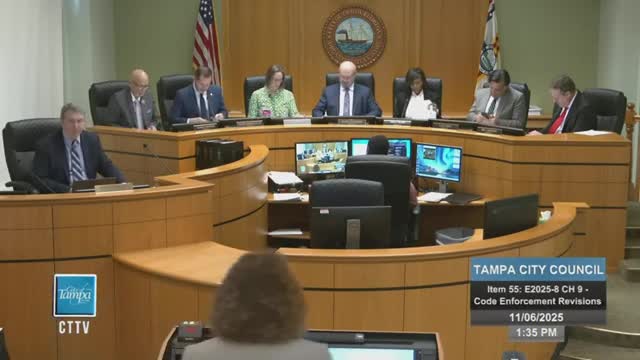Tampa council OKs first reading of Chapter 9 changes to allow paid special magistrates, asks staff to prioritize volunteers
Get AI-powered insights, summaries, and transcripts
Subscribe
Summary
After months of backlog and legal concerns, the council voted to approve on first reading an ordinance that would let the city hire outside counsel to serve as paid special magistrates for code enforcement. Councilmembers insisted volunteers be prioritized and asked staff for cost and process reports before second reading.
City Council approved on first reading an ordinance to amend Chapter 9 of the city code so the legal department may hire outside counsel to serve as special magistrates in code‑enforcement hearings, a change staff says was prompted by scheduling shortages, an 18‑month backlog of cases and at least one court finding of a legally deficient magistrate order.
City Attorney Andrea Zelman said the city had relied on volunteer special magistrates “for quite some time” but had become unable to staff hearings. “We had an 18 month backlog in code enforcement cases,” Zelman told the council, adding that the city sometimes had only one or two volunteers available and that hearings were being canceled. She also said judges had found at least one prior magistrate order legally deficient. “There’s no point in having a code if we can’t enforce it,” Zelman said.
The ordinance makes several changes limited to Chapter 9 of the municipal code: it adds explicit authority for the legal department to retain an attorney to act as a special magistrate, updates the local definition of “repeat violator” to mirror Florida statute, clarifies lien‑settlement language and aligns demolition penalties for certain historic properties with 2025 state legislation (Senate Bill 582). Kamaria Pettisnacko, who presented the draft ordinance for the legal department, said the change will also tidy deadlines for filing challenges and rehearing requests so they track the order date rather than file‑upload dates.
Councilmembers from across the dais praised the goal of legal clarity while pressing several operational points. Many members said attorneys can reduce legal risk but voiced concern about the loss of a citizen‑volunteer approach that, they said, felt more compassionate to homeowners who could not afford repairs. “There is something to be said… about mercy and compassion,” Councilman Viera said during debate. Several members asked staff to report back on the budget impact of paid magistrates after one year and to explore ways to revive or re‑prioritize the volunteer magistrate pool.
Councilwoman Hertek moved to approve the ordinance on first reading with an instruction to amend Section 3 between first and second reading so volunteer magistrates are prioritized and paid attorneys used as a backup. The motion carried on first reading; one councilmember recorded a no vote. Council also directed staff to return between readings with a report on costs and on options to strengthen and expand the volunteer magistrate program and training.
What happens next: The ordinance was set for second reading and adoption on Dec. 4, 2025. Staff said the hourly rate paid to outside magistrates in the current arrangement is $225 and that settlement practice for liens continues to be governed by an executive order (the Distressed Structure Rehabilitation Program) that permits soft‑cost lien waivers when owners pull required permits and complete corrective work. The legal department and council said they will explore training options so volunteers can return to a larger role over time.
Why it matters: Code enforcement affects property values, neighborhood conditions and residents’ pocketbooks. The change aims to reduce legal risk and shorten hearing waits; council concerns and the requested follow‑up focus on preserving community trust, limiting financial harm to low‑income homeowners and monitoring the budget impact of paid magistrates.
